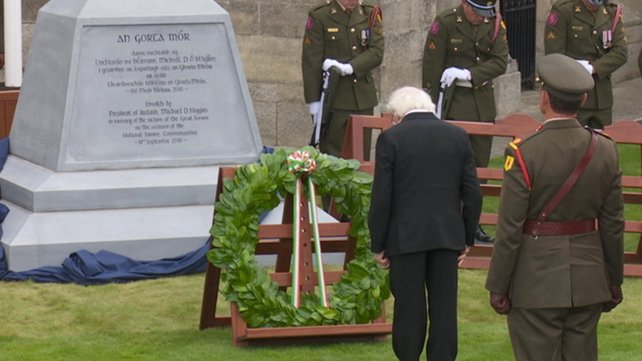Ireland: National Famine Commemoration at Glasnevin Cemetery
The annual National Famine Commemoration took place today at Glasnevin Cemetery, in Ireland's capital Dublin. Irish President Michael D Higgins unveiled a Celtic cross memorial to Ireland's one million Famine dead following the failure of the potato crop. At the height of the Famine more than 60 funerals a day were taking place at the cemetery. Glasnevin was one of Ireland's largest Famine burial sites. President Higgins said Glasnevin Cemetery is the “single largest burial ground for the victims of An Gorta Mór” with many “interred in mass graves, or ‘unpurchased graves’, with no headstone to mark their final resting place”. He added: "Surrounded by the remains of victims from all corners of the country, we should embrace the common bond that connects us to those who have gone before throughout the history of this island."
Ireland's Minister for Arts, Heritage, Regional, Rural and Gaeltacht Affairs Heather Humphreys said that the Famine left an "indelible mark on Ireland, devastating communities the length and breadth of this country." She went on to say "the annual Famine Commemoration provides us with an important opportunity to remember the one million people who perished, and the one million who were forced to emigrate as a result of the failure of the potato crop."
However, it is the British government's (who then ruled Ireland) response to the failure of the potato crop that continues to be highlighted when looking at this catastrophic period of Irish history. Between 1845 and 1852 the Great Famine (Irish: an Gorta Mór) or the Great Hunger was a period of mass starvation, disease, and emigration in Ireland. Yet the export of food crops and livestock from Ireland continued over that period. John Mitchel, one of the leaders of the Young Ireland Movement, wrote in 1860:
I have called it an artificial famine: that is to say, it was a famine which desolated a rich and fertile island that produced every year abundance and superabundance to sustain all her people and many more. The English, indeed, call the famine a "dispensation of Providence;" and ascribe it entirely to the blight on potatoes. But potatoes failed in like manner all over Europe; yet there was no famine save in Ireland. The British account of the matter, then, is first, a fraud; second, a blasphemy. The Almighty, indeed, sent the potato blight, but the English created the famine.
Image from RTÉ : President Higgins lays wreath at new Famine memorial

- Eibhlin O'Neill's blog
- Log in to post comments





